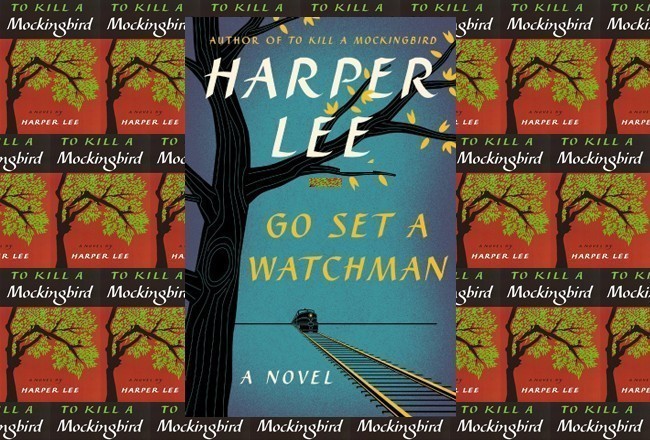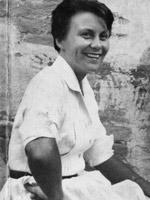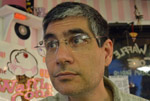
Welcome to part six of FlaglerLive’s live-blogging of “Go Set a Watchman.” We’ve invited 10 people of varied backgrounds from around the community to read the book and write their response to each of its 19 chapters, from whatever perspective they choose, at whatever length they choose, in 19 installments over the next few weeks. For a few more details on the project, read the introduction here. As always, we start with a summary of the chapter at hand and dive right into the critics’ responses. So you’re forewarned: the spoiler alert is implied.
But today I’m especially giddy. We’ve been joined by an 11th writer: Circuit Judge Mark Carpanini of the 10th Judicial Circuit in Florida. He sits in Polk County, where I met the judge in 1995 when I started as a reporter at the Lakeland Ledger. I was the county reporter, he was the county attorney, he read a lot more than law, as I very quickly found out, and we developed a habit of getting the business of official interviews and background briefings out of the way quickly so we could talk about what really mattered: whatever books we were reading at the time. We stayed in touch. When I proposed the Watchman project, he did not hesitate. I knew we’d all be in for a treat, but had no idea of the parallels Judge Carpanini is bringing to the history behind Watchman and Mockingbird. I’ll let him describe them, though I imagine he’d have gotten along quite well with Judge John Taylor.
Thank you for joining us Judge.
–Pierre Tristam
![]()

Our Ten Critics: Quick Links
- Today’s Chapter Summary
- Mark Carpanini
- Darrell Smitty Smith
- Jay Livingston
- Inna Hardison
- Daniel Masbad
- Bill McGuire
- Brian McMillan
- Mary Ann Clark
- Jon Hardison
- Monica Campana
- Pierre Tristam
![]()
Chapter 6 summary: The longest chapter dives into the shortest: Jean Louise’s and Henry’s swim by Finch’s landing is all over town, with a twist. Gossip has it they were naked. Aunt Alexandra hears of it and wakes up Jean Louise, amplifying the rumor. She clues in Atticus, who doesn’t take the matter too seriously. “I hope you weren’t doing the backstroke,” he tells his daughter. Alexandra is not placated. “Even if you did go in with your clothes on, Maycomb won’t give you credit for it. You might as well have gone in naked.” It’s Sunday. So the family is going to Sunday school. The chapter introduces readers to John Hale Finch, retired doctor. Jean Louise complies with the religious ritual, but also repeats her habit of falling asleep with her eyes open through the lesson.
 Circuit Judge Mark Carpanini took office in the Tenth Judicial Circuit in Florida in 2005 in Polk County, where he still serves: As I came to this project late, of necessity I have had to catch up. When I told my friends I was reading this book, I was met with the same reaction from many of them, namely, the book had received enough negative reviews to scare them away from it. I think there may be something more to it than that. It is no secret that the book reveals Atticus’s racist propensities and no one likes to have the reputation of one of their heroes sullied. I doubt I would have read the book if Pierre had not gotten me involved in this project. I am glad Pierre invited me to participate, as I have become thoroughly engrossed in it. That the book is in a sense iconoclastic is not for me a negative. As Kafka says: “I think we ought to read only the kind of books that wound or stab us. If the book we’re reading doesn’t wake us up with a blow to the head, what are we reading for?”
Circuit Judge Mark Carpanini took office in the Tenth Judicial Circuit in Florida in 2005 in Polk County, where he still serves: As I came to this project late, of necessity I have had to catch up. When I told my friends I was reading this book, I was met with the same reaction from many of them, namely, the book had received enough negative reviews to scare them away from it. I think there may be something more to it than that. It is no secret that the book reveals Atticus’s racist propensities and no one likes to have the reputation of one of their heroes sullied. I doubt I would have read the book if Pierre had not gotten me involved in this project. I am glad Pierre invited me to participate, as I have become thoroughly engrossed in it. That the book is in a sense iconoclastic is not for me a negative. As Kafka says: “I think we ought to read only the kind of books that wound or stab us. If the book we’re reading doesn’t wake us up with a blow to the head, what are we reading for?”
I have lived in Polk County, Florida, for 35 years now. Polk County is a large county of some 600,000 people that occupies the space between Tampa and Orlando. While in my perception the similarity between Polk County and Maycomb County is not striking. it is certainly noteworthy. For example, as a lawyer I have reviewed old deeds for the conveyance of land for schools for the education of white children exclusively, and the plans for the old courthouse here depict a “negro” or “colored” balcony, I can’t remember which. The county seat, Bartow, was named after Francis Bartow, a fervent secessionist who fell as a confederate officer during the battle of Manassas. As in Maycomb County, Polk County had a number of very prominent families whose influence over the years has diminished if for no other reason than by the influx of new arrivals. And until recently, Polk County was very much agriculturally oriented. Maycomb County resonates with me.
I am originally from New York City, therefore my personal experiences are in a way the reverse but similar to those of Jean Louise’s. I would periodically return to New York City from Polk County, and the trips were inevitably disorienting at the least, and sometimes disturbing.
I do not pretend to be able to technically critique a book. I can say that I find the style easy, the narrative colorful, and the structure cohesive. All of the characters major and minor have come alive, including Jean Louise, Atticus, and Henry, Alexandra, and Calpurnia. If I met them on the street I feel I would be able to conduct a meaningful conversation. It is for me a page turner.
Jean Louise, at Atticus’ insistence, left Maycomb County. Why? Did Atticus recognize the limited opportunities that would present themselves in Maycomb? Did he recognize the stultifying class structure, not to mention the racial dynamics that would be problematic for his daughter? Did he recognize he had not raised up a daughter who would happily spend the rest of her days there? Could he foresee the conflict to come? It is her sojourn to New York City that ultimately sets up the later conflict. If she had not gone to New York, she would never have had the yardstick against which she measures Maycomb, and ultimately Atticus. Whatever sense of social justice she may have gleaned early from Atticus would likely have been blunted if not eradicated with the passage of time spent in Maycomb. She would certainly have married Hank early on.
Alexandra is an interesting character. Married to a man she probably did not love in any romantic sense because that is what girls did in Maycomb. They got married and had babies. That her husband decided to stay at the fish camp was of no import to her, and her going to live with and help out Atticus was beneficial to all concerned. It’s a lifestyle she probably preferred to living with her husband. It is apparent though that she in no sense became a surrogate mother to Jean Louise. Rather she appears more as Scout’s antagonist. Aunt Alexandra also points out that social divides in Maycomb County are not entirely drawn along racial lines, but also socio-economic ones. She relates in no uncertain terms to Jean Louise that there are white folk who are simply trash, and further, that if you were born of trash it was quite likely you would turn out no good (specifically referring to Henry. Maycomb society is a caste system.)
Atticus himself through the years apparently led a very predictable life. Rural southern counties used to be replete with sole practitioners and two-lawyer partnerships. Those lawyers were of necessity generalists, as was Atticus. While Jem may have been groomed for the role of partner successor to Atticus, Henry quite naturally filled the role after Jem’s death. It would have been customary in that setting that each lawyer knew every other lawyer and the apparently one judge. Polk County was like this 35 years ago, with the exception that even then there was more than one judge and there were a few preeminent multi-lawyer firms which cultivated such personages as Spessard Holland and Lawton Chiles, both of whom served as governor and senator, to name just two.
Through Chapter 5, I see a Jean Louise torn between Maycomb County and the outside world. She recognizes that she spent many happy days in Maycomb, as recounted in her childhood memories, but has seen enough of New York that she has serious doubts over whether she could spend the rest of her life there. She recognizes that if she marries Hank, she would. It is significant that Scout specifically recalls Dill and notes that not only did he get out of Maycomb County, but that he would have been supremely unhappy had he stayed. “How you gonna keep em down on the farm, after they seen Paree?”
 Darrell Smitty Smith, Flagler Beach AC technician, FlaglerLive contributor and George Carlin reincarnation: As we read this pre-quill to our beloved Mockingbird, we all can see there is a pronounced difference in quality, storyline and, hell, all phases of the novel we came to love versus what we are reviewing here. The most noteworthy being that Atticus may not have been the Crusader for Racial Equality he pioneered in Mockingbird, but may have been more attuned and anchored to the attitude that prevailed in the South in the 30’s. Cursedly pragmatic, which is an instant disqualification for Sainthood today.
Darrell Smitty Smith, Flagler Beach AC technician, FlaglerLive contributor and George Carlin reincarnation: As we read this pre-quill to our beloved Mockingbird, we all can see there is a pronounced difference in quality, storyline and, hell, all phases of the novel we came to love versus what we are reviewing here. The most noteworthy being that Atticus may not have been the Crusader for Racial Equality he pioneered in Mockingbird, but may have been more attuned and anchored to the attitude that prevailed in the South in the 30’s. Cursedly pragmatic, which is an instant disqualification for Sainthood today.
This has come to represent one of the most beloved features of TKaM through the years. A sort wide-eyed Pollyannish lack of cynicism usually ridiculed in order to be considered a Serious Write back then, let alone today. No less than Flannery O’Connor had this to say: “For a child’s book it does all right. It’s interesting that all the folks that are buying it don’t know they’re reading a child’s book. Somebody ought to say what it is.” And I’m sure the famously catty O’Connor meant this in an insulting way. Discarding consideration of the fact that the child in us all is what we come to value most in life, especially as we age; and losing this gift is one of our greatest fears of decrepitude, if not its clearest onset.
Aside from this brightness, the difference in attitude in the two novels is so obvious and profound that must give consideration to at least some of the rumors that have been in circulation for years in order to explain these variations. So I think it’s time to list a few of the rumors regarding Ms. Lee in light of the obvious shortcomings on display in Watchman. I believe the best way to do this is to consider them individually and see how they fit with what we have observed in our reading of this book. Choose or discard as you wish.
So first, is the writing in Watchman consistent with Lee’s previous and post-literary output? In other words, is it agreed by literary scholars that she wrote Watchman herself? Because as this is her first draft of a first novel, it should be in her own undeniable voice, consistent with her other publications. The verdict is yes, she wrote it. At least according to the Digital Data Miners (let’s just call them Geek 1 and Geek 2), published in the Wall Street Journal. See Data Miners Dig for Answers About Harper Lee, Truman Capote and ‘Go Set a Watchman’. They wrote an Algorythmic program for the CIA that was meant to analyze the speech pattern for quotes attributed to various political leaders around the world and determine if they were actually in their ‘voice’ or mistranslated or phony by analyzing the A’s ands and the’s in the patterns of how these simple words were used. It happened that it also could determine if a work of literature was really written by the credited author, except it did not pay the millions they made from Homeland Security.
The program concluded that there is an over 97 percent probability that Watchman was written by Harper Lee. Mockingbird, not so much. Which tends to confirm some of the rumors–and answers why she never wrote another novel, in spite of both the financial rewards and accolades it would have presumably brought. It also gives insight into the bitterness toward the mere mention of her masterpiece and her bitter reclusiveness since its publication.
So who did actually write To Kill a Mockingbird? Stay tuned. Daa Daaa Da Dummm…
 Jay Livingston, attorney with Livingston & Sword in Palm Coast: [To come.]
Jay Livingston, attorney with Livingston & Sword in Palm Coast: [To come.]
 Inna Hardison, co-owner of Ha Media and former publisher of Palm Coast Lifestyles magazine:I giggled at Zandra’s discomfort over the supposed skinny dipping incident. Had it been better written I would have laughed, yet this little tiny chapter was not without merit for me. I think it’s the closest I’ve seen Atticus and Scout’s relationship to what one should reasonably imagine it being. But of course through all of it, the lighthearted and the funny and the well-deserved jabs at the prim and proper hatted and shod Maycomb society, there was a nagging feeling that something bad was going to happen. I hate ending any portion of a book feeling that, as the Russian in me is all too accustomed to such feelings always being warranted.
Inna Hardison, co-owner of Ha Media and former publisher of Palm Coast Lifestyles magazine:I giggled at Zandra’s discomfort over the supposed skinny dipping incident. Had it been better written I would have laughed, yet this little tiny chapter was not without merit for me. I think it’s the closest I’ve seen Atticus and Scout’s relationship to what one should reasonably imagine it being. But of course through all of it, the lighthearted and the funny and the well-deserved jabs at the prim and proper hatted and shod Maycomb society, there was a nagging feeling that something bad was going to happen. I hate ending any portion of a book feeling that, as the Russian in me is all too accustomed to such feelings always being warranted.
So I wait, for whatever that bad thing may be, hoping Lee spares us too many useless pages in between this excruciatingly long set-up and wherever this damn journey is supposed to take us.
 Daniel Masbad, 2015 high school graduate (home-schooled) and concertmaster of the Flagler Youth Orchestra: [To Come.]
Daniel Masbad, 2015 high school graduate (home-schooled) and concertmaster of the Flagler Youth Orchestra: [To Come.]
 Bill McGuire, Palm Coast City Councilman and management consultant: I have chosen to combine chapters six and seven since they both dwell on the topic of Sunday religious services in Maycomb. As in many Southern and Midwestern towns Sunday church has certain timeless rituals. The women of the church are preoccupied with how they look and how they are visualized by the other dowagers in the congregation. Aunt Alexandra continues to be somewhat of a comedic foil. I’m still marveling at the fact that her husband deserted many years ago because he would rather sit on a muddy bank and fish then partake of her company. I guess every family has some middle-aged female member who spends most of her waking life putting on airs and trying to be something that she is not. I could write a small volume on the ones in my family, and I’ll bet you could too.
Bill McGuire, Palm Coast City Councilman and management consultant: I have chosen to combine chapters six and seven since they both dwell on the topic of Sunday religious services in Maycomb. As in many Southern and Midwestern towns Sunday church has certain timeless rituals. The women of the church are preoccupied with how they look and how they are visualized by the other dowagers in the congregation. Aunt Alexandra continues to be somewhat of a comedic foil. I’m still marveling at the fact that her husband deserted many years ago because he would rather sit on a muddy bank and fish then partake of her company. I guess every family has some middle-aged female member who spends most of her waking life putting on airs and trying to be something that she is not. I could write a small volume on the ones in my family, and I’ll bet you could too.
Church service, as expressed in our story, is also a sad commentary on religious expression in many communities, and not necessarily small communities. The minister drones on interminably, his message is judgmental, not particularly inspirational, and one can only wonder if any of the congregation leave the church spiritually uplifted. Nevertheless, certain rituals must be observed The ladies, especially the middle-aged spinsters are dressed to the nines. They sit together, a solid phalanx of Christian, platitudinous busybodies. We are also introduced in this chapter to the brother of Atticus, one Dr. John Finch, who seems to be portrayed as a community intellectual, far more learned than the other citizens of the community and given to flaunt his literary acumen frequently. Everyone seems to be taking different degrees of humor from the escapades of Jean Louise and Henry on the previous evening. Dr. John’s sardonic commentary seems to be the majority opinion. Analysis of the church ritual includes passing the collection plate and the proper delivery of the church’s hymns. Here we touch upon the first incident where Southern sensitivities are offended by the incursion of the North. Which hymns should be sung, and how can they be sung is a bone of contention for some of the members of the congregation. The minister does not seem to be particularly popular and certainly not very influential. As in many churches, particularly small Protestant churches, the ministers are chosen by the regional hierarchy and assigned to the church in question. The minister, Mr. Stone, has clearly not won over his flock. Being labeled a liberal in a southern conservative community does not bode well for his tenure.
The rest of the chapter deals with critical analysis of the hymns and the way they should be delivered. It is reminiscent of bumper stickers that were prominently displayed in the South not too many years ago, “We don’t care how you did it up north!” Having been presented with some of the personalities and mores of the South we are now ready to move forward and consider early aspects of the civil rights efforts, which is what I thought this book was going to be about when I started reading it.
 Brian McMillan, columnist and executive editor of the Palm Coast Observer:In chapter six, Alexandra is shocked at the news that Jean Louise went skinny dipping with Henry. The interesting part about it is that Jean Louise doesn’t rush to defend herself. She knows, and the reader knows, that she didn’t go skinny dipping, per se: She went swimming with her clothes on.
Brian McMillan, columnist and executive editor of the Palm Coast Observer:In chapter six, Alexandra is shocked at the news that Jean Louise went skinny dipping with Henry. The interesting part about it is that Jean Louise doesn’t rush to defend herself. She knows, and the reader knows, that she didn’t go skinny dipping, per se: She went swimming with her clothes on.
It’s human nature to fixate on what’s fair, so it demonstrates a lot of self control for Jean Louise to ignore the allegations for so long. It’s also effective as a way to cause some anxiety in the reader: We want justice more than Jean Louise does. I suppose it would be considered dramatic irony, because we know something Alexandra doesn’t.
 Mary Ann Clark, founder of Flagler Reads Together and president of the Flagler County Historical Society: And now to Sunday school and church with the Finches segregated by sex for no known reason, with plenty of time to meditate during the sermon. The choir’s surprising, to the congregation, rendition of the Doxology (one of my favorite hymns) is a good example of the “evils” of sending representatives to workshops where newfangled ideas are presented!
Mary Ann Clark, founder of Flagler Reads Together and president of the Flagler County Historical Society: And now to Sunday school and church with the Finches segregated by sex for no known reason, with plenty of time to meditate during the sermon. The choir’s surprising, to the congregation, rendition of the Doxology (one of my favorite hymns) is a good example of the “evils” of sending representatives to workshops where newfangled ideas are presented!
Learning the origin of the title of this book prompted me to read Isaiah 21. My interpretation is that the watchman learns that Babylon’s gods had fallen and been destroyed just as Lee is going to write of her disappointment in her father, her guiding light.
 Jon Hardison, co-owner of Ha Media in Palm Coast and member of the FlaglerLive board of directors: In chapter 6, Jean Louise and Hank have a dare and find themselves in the river. It’s now the next morning and wouldn’t you know it – the “news” of their misdeeds, though exaggerated, has already reached the ears of Aunt Alexandra who is persistent in her attempts to raise Scout from her slumber to explain herself. You see, they stand accused of skinny-dipping together in the river and it’s already all over town. Matters are compounded by the fact that it’s Sunday – Aunt Alexandra’s one day a week to lead the hens in dispensing the week’s happenings after Sunday School. This week she’d have to sit back with the rest and take one for the team. Exaggerated or not, Jean Louise seems all too happy to watch her Aunt squirm, but Atticus spoils the fun when he finds Scout’s wet cloths about the room. I’d half hoped Atticus wouldn’t release his sister quite so easily.
Jon Hardison, co-owner of Ha Media in Palm Coast and member of the FlaglerLive board of directors: In chapter 6, Jean Louise and Hank have a dare and find themselves in the river. It’s now the next morning and wouldn’t you know it – the “news” of their misdeeds, though exaggerated, has already reached the ears of Aunt Alexandra who is persistent in her attempts to raise Scout from her slumber to explain herself. You see, they stand accused of skinny-dipping together in the river and it’s already all over town. Matters are compounded by the fact that it’s Sunday – Aunt Alexandra’s one day a week to lead the hens in dispensing the week’s happenings after Sunday School. This week she’d have to sit back with the rest and take one for the team. Exaggerated or not, Jean Louise seems all too happy to watch her Aunt squirm, but Atticus spoils the fun when he finds Scout’s wet cloths about the room. I’d half hoped Atticus wouldn’t release his sister quite so easily.
 Monica Campana, just-retired head librarian at Indian Trails Middle School and free-speech advocate: Chop, chop, chop. Tiresome, choppy conversations mixed with irrelevant questions like “How can you drink ice-cold milk for breakfast.” What’s the point? When there is a point to be made– “Calpurnia used to say, when Jem and I’d beg her for coffee, that it’d turn us black like her”–it is followed up with “Are you worn with me?” instead of an enlightening conversation. At least we get to meet someone interesting in this chapter – Dr. John Hale Finch (Atticus’s brother). “Home for nineteen hours and you’ve already indulged your predilection for ablutionary excesses, hah!” I would of enjoyed knowing this guy.
Monica Campana, just-retired head librarian at Indian Trails Middle School and free-speech advocate: Chop, chop, chop. Tiresome, choppy conversations mixed with irrelevant questions like “How can you drink ice-cold milk for breakfast.” What’s the point? When there is a point to be made– “Calpurnia used to say, when Jem and I’d beg her for coffee, that it’d turn us black like her”–it is followed up with “Are you worn with me?” instead of an enlightening conversation. At least we get to meet someone interesting in this chapter – Dr. John Hale Finch (Atticus’s brother). “Home for nineteen hours and you’ve already indulged your predilection for ablutionary excesses, hah!” I would of enjoyed knowing this guy.
 Pierre Tristam, editor of FlaglerLive: Long-winded as I’ve been in previous chapters, I’ll echo Lee and keep it short in this one. I am struck by the contrast between the Jean Louise of the previous chapter, where she doffs clothes in her memory as easily as she did in Mockingbird, and her skittishness in this chapter, understandable though it may be.
Pierre Tristam, editor of FlaglerLive: Long-winded as I’ve been in previous chapters, I’ll echo Lee and keep it short in this one. I am struck by the contrast between the Jean Louise of the previous chapter, where she doffs clothes in her memory as easily as she did in Mockingbird, and her skittishness in this chapter, understandable though it may be.
But she’s not being modest for Henry’s sake. She made it clear that she’d have an affair with him from the first chapter. She may not be there yet. But he’s a prop in this chapter, as he has been all along. Her modesty is a matter of legacy. She reveres Finch’s Landing. It is her last true earthly connection to Maycomb, now that her father has moved to a new house and the old house of Mockingbird has been replaced by an ice cream parlor. So her reserve, which Henry did not understand, which Aunt Alexandra certainly doesn’t understand the next day, and which Atticus appears not to be interested in understanding (just as I’m not so sure Harper Lee understood it, either) is part of that brief communion with the past which Scout doesn’t want shattered by a vulgar act, or at least something so frivolous as to break the spell she’s under. It may work for her. It doesn’t for Maycomb. The town indicts her anyway, making up the story of the lovebirds’ naked swim. But that part isn’t more effective than as a foil for Atticus’s humor and Alexandra’s vise of a rear.
The chapter dips from there. Brief as it is, it manages to have that characteristic double-fold of Lee chapters, this time heading off to the disjointed claptrap-scene of Sunday school. But who is to believe that Jean Louise of Manhattan, at 26, is still going to Sunday school no matter how bidden by her father? It appears she still needed a nap.





























Ellie says
Those of you who don’t like it probably object to a female point of view and the college level writing as opposed to the 8th grade reading level of Mockingbird you’re probably comfortable with. It’s The Help for the literate and very relevant to current events.
Ellie says
I love her Jane Austen like deadpan satire of social mores.
inna hardison says
Ellie – I can’t answer for anyone else, but for me – I don’t mind the female point of view in most things, frankly, not sure I notice the perspective all that much. It’s more the strange need by Lee in this book to be clever, if you will, at the expense of the narrative and the language that in that other book, 8th grade level or not, was rather cliche-free and admirably well-wielded in general. Maybe this is how we learn what great editing is all about, the merciless cutting off of all that is pretentious and gratuitous and getting to a point of some kind, be it in a sentence, a chapter or a book.
Then again, it could just be me, as I never did care for Jane Austen’s stuff either, satire or otherwise.